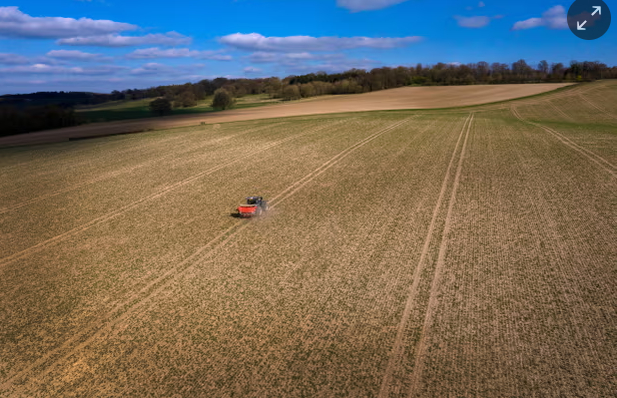December 31, 2025 | 01:47 GMT +7
December 31, 2025 | 01:47 GMT +7
Hotline: 0913.378.918
December 31, 2025 | 01:47 GMT +7
Hotline: 0913.378.918

Farmers face a dilemma: to get more flowering plant species and pollinators, the land needs to be less fertile, which reduces yields. Photograph: Nigel Francis/Alamy.
Using high levels of common fertilisers on grassland halves pollinator numbers and drastically reduces the number of flowers, research from the world’s longest-running ecological experiment has found.
Increasing the amount of nitrogen, potassium and phosphorus doused on agricultural grassland reduced flower numbers fivefold and halved the number of pollinating insects, according to the paper by the University of Sussex and Rothamsted Research.
Bees were most affected – there were over nine times more of them in chemical-free plots compared with those with the highest levels of fertiliser, according to the paper, published in the journal npj Biodiversity.
The lead researcher, Sussex University’s Dr Nicholas Balfour, said: “As you increase fertilisers, pollinator numbers decrease – that’s the direct link that to our knowledge has never been shown before.
“It’s having a drastic effect on flowers and insects. The knock-on effect goes right up the food chain,” he said.
This is primarily because fertilisers create conditions that allow fast-growing grasses to dominate, crowding out other grasses and flowers. It is generally assumed that having a greater diversity of flowers leads to a greater diversity of pollinators, which often have specialist requirements in terms of the blooms they like to visit.
The research was done in Rothamsted, Hertfordshire, on strips of grassland called Park Grass, which have been studied since 1856.
The average use of fertiliser on grassland in the UK is about 100kg for every hectare. The highest amount in the experiment was 144kg a hectare, to which the greatest pollinator declines (of 50% or more) were linked.
Even land spread with the average amount, however, had 42% fewer pollinators and five-fold fewer flowers than land with none. The results were most pronounced on plots treated with nitrogen, the most widely used type of fertiliser. Researchers found that plots treated with a fertiliser mix excluding nitrogen maintained a relatively high number of pollinators and flowers.
Almost all grassland in the UK is “improved” – meaning it is fertilised to some degree. Only 1% to 2% of grasslands in the UK are high-quality species-rich habitats, according to the study. Nationally, the UK has lost 97% of wildflower meadows since the 1930s, and studies have shown a widespread decline in numbers of pollinating insects.
Researchers also measured the productivity of each grassland plot by weighing the amount of hay produced at the end of the season. They counted pollinators such as bees, hoverflies, butterflies, wasps and flies across 18 strips of land subject to different fertiliser treatments.
Over the past decade the demand for agricultural fertiliser has increased. Prof Francis Ratnieks, an entomologist at Sussex University, said: “I visited Park Grass many years ago and realised the unique opportunity it provided to study the effect of fertilising grasslands on wildflowers and bees.
“Considering the current focus on fertiliser use, and the substantial declines in pollinator numbers over recent years, this study could not have come at a better time, as we seek to understand how landowners can best help bees and other pollinators through open grassland areas,” he said.
This study illustrates the problem farmers face: to get more flowering plant species and pollinators, the land needs to be less fertile, which reduces yields.
“Our most important and challenging finding is the existence of a trade-off between flower and pollinator diversity and grassland yield,” researchers state in the study. They highlight the need for financial incentives in the UK and EU to support biodiversity-friendly farming practices.
Balfour said: “While reduced yields aren’t typically thought of as a good thing, reducing grassland production intensity has the potential to realise many of the benefits of multifunctional landscape.” These include benefiting pollinators, improved soil health, better air quality and more resilience to extreme weather events.
Dr Philip Donkersley, a senior researcher in ecology and evolution at Lancaster University, who was not involved in the study, said: “What is interesting and novel here is the timeframes. Normally, our studies on this last four to five years. This is approaching 150 years of applying chemical and organic fertilisers, and therefore much more reflective of what has been happening on British farms.”
The Guardian

(VAN) From emissions cuts to energy sovereignty, France’s president reflects on COP21's legacy.

(VAN) A Yale University poll from earlier this month says most Americans see climate change as playing a role in hurting prices and the cost of living.

(VAN) According to the National Food and Strategic Reserves Administration, this year's autumn grain entered the market earlier and boasts good quality.

(VAN) The Trade Policy and Strategy Office (TPSO) under the Commerce Ministry reported that exports in November 2025 were worth US$27.445 billion, expanding for a 17th consecutive month at 7.1%.

(VAN) Ukraine’s leading poultry processor and exporter, MHP, plans to kick off a trial production of insect meal in the first quarter of 2026, as revealed by Serhiy Melnychuk, scientific advisor to the chairman of MHP.

(VAN) Researchers have warned of the unexpected consequences of extremely hot, humid conditions during pregnancy.

(VAN) A group of Iranian scientists from the National Institute of Genetic Engineering and Biotechnology claimed that they have developed a technology that allows effective processing of poultry feathers into meal using a Bacillus strain.